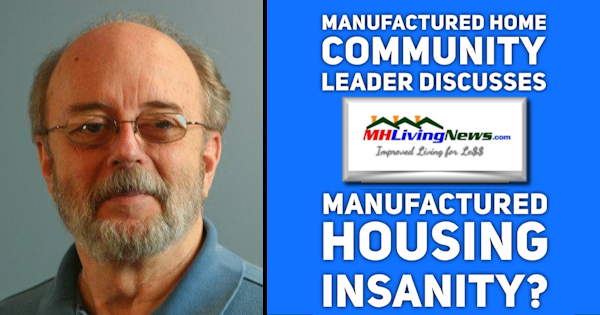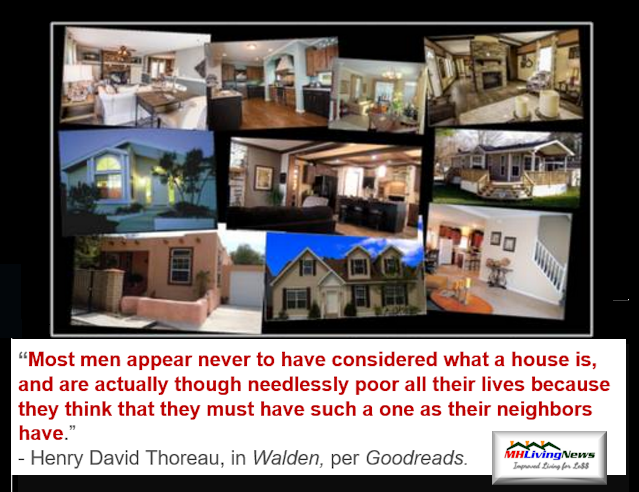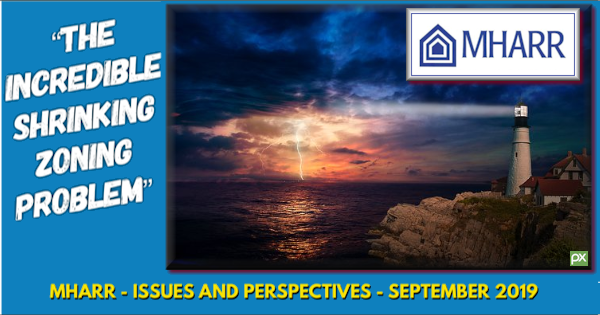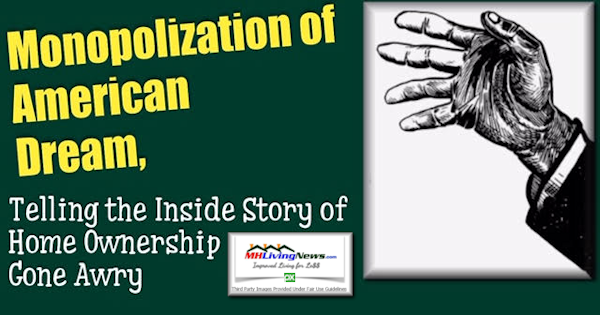Rent control is a hot topic in the U.S. as well as in Canada. It is an issue for those in apartments or other forms of rental housing, as well as numbers living in manufactured home land lease communities. The CBC News video below spells out the challenge in multifamily housing, north of the border. It will help tee up this issue for renters as well as those pondering or already involved in manufactured home living.
CBC News said, “The province’s new rent controls will be a boon for renters, at least in the short term. But in the long-run the rules may have the opposite effect.”
That report sets the stage for what follows.
Next is the word-for-word text of an article published on 9.18.2019 from page 10 of the quarter 3 issue of the Manufactured Housing Review (MHR). Kurt Kelley, J.D., is the publisher of MHR. We’ve spotlighted their sometimes controversial work in a previous related report, at this link here.
New York Landlords Challenge Rent Control Laws as an ‘Illegal Taking’
Staff Article, The Manufactured Housing Review

Last month, liberal consumer groups in New York celebrated the passing of sweeping new laws which permanently establish rent control and extended tenant protections throughout New York. These new laws allow cities to limit the dollar amount rent can be increased. New York City has had rent control laws in place for many years affecting about one million apartments. Landlord groups say the regulations deprive them of their property without compensation.
The Community Housing Improvement Program, CHIP, a trade association representing 4,000+ building owners, joined landlord plaintiffs in this lawsuit arguing, “rent control laws constitute a physical taking of property in violation of the Constitution’s fifth amendment, the ‘Taking Clause’.” The suit seeks New York’s new rent control law thrown out. “The Rent Stabilization laws, among other things, deprive property owners of a reasonable market return on their investment, devalue their properties, and upset their investment-backed expectations,” wrote attorney, Reginald Goeke, who represents the building owners and landlords.
The landlords contend, “Those who benefit the most from the rent control rules are not the cash-strapped, but rather, the affluent residents in Manhattan.” Thus, the suit argues, rent laws cannot be justified on grounds that the regulations help stabilize the cost of living for low-income families.
Rent stabilization laws also encourage tenants to stay in their apartments for a long time, even when a family outgrows their living space. Consequently, rent stabilized units have low turnover and keep vacancy rates low, which usually means housing costs go up. With rent control laws, it’s common for high income, high net worth long-term tenants to have rent rates considerably less than low income, low net worth more recent tenants. Taken together, the new rent law is “arbitrary and irrational,” according to the landlord’s lawsuit.
Courts have upheld rent stabilization laws in New York in recent years and the U.S. Supreme Court has affirmed the government’s right to regulate rent going back to 1921, (when the controls were put in place to combat the rising cost of housing). Because these new stabilization laws are more extreme than the regulations of the past, landlord advocacy groups argue the new court challenge has a chance of dismantling them.
TenantsPAC, a tenant advocacy group, disagrees. TenantsPAC reports Landlords are trying to defeat renter protections in court using an old
Attorney General James stated that her office is committed to defending the state’s rent control laws. Rent control laws exist in cities around the country, including cities in New Jersey, California, Maryland and Washington DC. In 2019.
Oregon became the first state to institute rent control statewide. ##
The original article from MHR looks like the download found at this link here.
That shared, here is the definition of plagiarism. “Plagiarism is the “wrongful appropriation” and “stealing and publication” of another author’s “language, thoughts, ideas, or expressions” and the representation of them as one’s own original work. Plagiarism is considered academic dishonesty and a breach of journalistic ethics.” That is according to Wikipedia.
With the definition above in mind, now let’s turn to an article by Bobby Allyn published on July 17, 2019 by NPR at this link here. What follows is word-for-word, so the duplication of the word ‘the’ in the 13th paragraph, or any other glitches, are in the original.
New York Landlords Call Rent Control Laws An ‘Illegal Taking’ In New Federal Lawsuit

Last month, housing advocates in New York celebrated sweeping new laws that established rent control permanently and extended tenant protections beyond just New York City, allowing cities throughout New York to opt into rent stabilization programs, which limit how much rent can be increased.
In New York City, those rent caps affect about 1 million apartments, and landlord groups say the regulations not only deprive them of income, but the rules also violate their constitutional rights.
The Community Housing Improvement Program, a trade group that represents 4,000 building owners, joined other landlord plaintiffs in the lawsuit arguing that rent stabilization laws “effect a physical taking of property in violation of the Constitution’s Takings Clause,” according to the suit, citing a clause of the Fifth Amendment.
The suit, filed in U.S. District Court in Brooklyn this week, is not asking for monetary damages, but instead seeks to have New York’s new rent stabilization laws thrown out.
“The Rent Stabilization Laws, among other things, deprive property owners of a reasonable market return on their investment, devalue their properties, and upset their investment-backed expectations,” wrote lawyer Reginald Goeke, who is representing the building owners and landlords.
The suit says those who benefit the most from the rent rules are not cash-strapped, but rather, affluent residents in Manhattan. Because of this, the suit argues, the rent laws “cannot be justified” on the grounds that the regulations help stabilize the cost of living for low-income families.
According to the suit, the laws also encourage tenants to stay in their apartments for a long time, even when a family may need more space. As a consequence, rent stabilized units have low turnover and keep vacancy rates low, which usually means housing costs go up, the suit argues. Taken together, the rent laws are “arbitrary and irrational,” the suit contends.
Courts have upheld rent stabilization laws in New York in recent years and the U.S. Supreme Court has affirmed the government’s right to regulate rent going back to 1921, when the controls were put in place to combat the rising cost of housing.
Yet landlord advocacy groups argue the new court challenge may still have a chance of dismantling rent stabilization laws because, as they see it, the latest batch of New York rent rules are more extreme than past regulations.
Mike McKee, a tenant organizer with TenantsPAC, doesn’t think so. He said the plaintiffs in the case are trying to defeat renter protections with an old argument that has a bad track record.
“They have a very weak argument. They have lost in court with this case for almost a hundred years,” McKee told NPR. “These arguments haven’t won again, again and again. It’s not going to win this time either.”
McKee said landlord complaints that the laws will crimp earnings have been overstated. “They’re still going to make a profit, they just won’t make as much as fast,” McKee said.
Among the reforms in the the tenants’ rights bill signed last month was a measure that eliminated a landlord’s ability to take a unit out of stabilization based on a tenant’s income. Such a change was necessary, McKee said, since thousands of rent stabilized units have been taken out of stabilization over the years.
McKee’s opposition to the lawsuit is joined by New York Attorney General Letitia James, who said in a statement that her office is committed
James said the tenant protections are “a critical step in reforming the state’s broken rent regulation system — a system that bad-acting landlords have manipulated and controlled for far too long.”
Rent control laws exist in cities around the country, including in New Jersey, California, Maryland and Washington, D.C. Earlier this year, Oregon became the first state to institute rent control statewide. ##

At MHLivingNews, we don’t claim to be attorneys, as Kurt Kelley is, but we strive to accurately cites sources – including legal ones. According to the Legal Zoom website, this is what they say about the “Legal Ramifications of Plagiarism” – “Although plagiarism is not a criminal or civil offense, plagiarism is illegal if it infringes an author’s intellectual property rights, including copyright or trademark. For example, the owner of a copyright can sue a plagiarizer in federal court for copyright violation.”
In MHR’s opening paragraph, they added the line “Manufactured home communities and rental homes are subject to this new law.” Note that on MHLivingNews and on our MHProNews sister-site, we often take a direct quote and turn the text bold and brown to make it pop, but otherwise the words are as in the original.
There are seemingly modest tweaks here and there, but otherwise, aren’t the two articles almost identical? Where was the credit given by MHR to NPR? We’ll stress in fairness that Kelley, as with anyone, should have the principle of wheat and chaff equitably applied, as he has done well on certain other topics. For example.

Perhaps it was just a mistake that MHR copied – without obvious credit on that page – the NPR article, or is there some other explanation? We’ll leave that up to keener, legal, or other minds to sort out.
Moving on…
From the Lawsuit filed by Reginald Goeke
That said, from the lawsuit cited by NPR and found linked here as a download, is the following. Note that the initials ‘RSL’ below is apparently an abbreviation for Rent Stabilization Laws.
- The RSL’s harmful effects are not limited to the subset of property owners that are subject to its requirements. To the contrary, the law:
- Exacerbates New York’s housing shortage by preventing the redevelopment of existing buildings to the full capacity permitted by zoning regulations;
- Makes market-rate apartments more expensive for the millions of New Yorkers not lucky enough to reside in or find a rent-stabilized apartment;
- Allows wealthy New Yorkers to continue to benefit unfairly from rent stabilization while penalizing low- and middle-income tenants; and
- Deters property owners from making improvements to existing stabilized apartments, the majority of which pre-date World War II, by imposing significant restrictions on their ability to recover the cost of improvements, which will leave tens of thousands of apartments frozen in the past, with plumbing and wiring that is lawful but does not comply with current code requirements—and in addition will substantially reduce employment in New York’s construction industry.
From the Western Manufactured Housing Communities Association (WMA)
The WMA has taken several routine steps to battle rent control in their state. One example is their video, posted below.
Both that video and what Reginald Goeke’s and associates legal brief cited are arguably valid issues, based upon years of experience, data, and what some would call economics 101. But why do neither WMA nor Kelley’s MHR presentations address the concerns about the lack of safeguards for residents of manufactured home communities? Why didn’t Kelley’s MHR raise the point that some of these rent control laws are being called for due outrage over the purportedly ‘black hat’ behavior of MHI member companies? For a deeper dive on that, see the linked and related reports, including the one immediately below. It focuses on the real-world problems and proposed solutions by a resident-community leader.

Recently, the Manufactured Housing Institute (MHI) produced a new video that seemingly aims to ease the affordable housing crisis. That video is below.
While in some ways that is a well-done video, however, it leaves out a significant point that MHLivingNews’ publishers have raised for some years. Where is there any mention of HUD’s ‘enhanced preemption’ authority under the Manufactured Housing Improvement Act (MHIA) of 2000? Isn’t that a legal tool that could advance an obvious solution to the affordable housing challenges that HUD Secretary Carson has repeatedly said he favors addressing? Why is it that MHI seems to go half-way, instead of more robustly into solutions that could benefit consumers and ethical businesses alike? For more on those MHI related concerns, see the report linked here.
Why the MHIA and enhanced preemption matters is explained by Mark Weiss, J.D., President and CEO of the Manufactured Housing Association for Regulatory Reform (MHARR) in the quote below.
Affordable housing is needed. More new housing must be built to solve the crisis. Manufactured homes are a proven, positive solution. Developers could find support in the enhanced preemption clause of the MHIA law to overcome local zoning obstacles and NIMBYism. But rent control could be a deterrent to developing for investors, as Canadians and Americans have both discovered, ultimately making the problem worse, as CBC News stated in their video shown above.
The solution?
Once more, we’ll point to the thoughts detailed in the report linked here as well as others below the byline and notices by manufactured home resident leader, Robert ‘Bob’ Van Cleef. The additional related reports further below will shed light on this increasingly vexing issue.
America demonstrably becomes a richer nation when we can sustainably and ethically encourage more homeownership. That means that more building and appropriate preservation must be done. As the National Association of Realtors 2018 research, or decades of other 3rd party studies linked here demonstrate, nothing is proven to be more affordable in the way of new permeant homes than modern manufactured homes.

That said, roadblocks that are often artificial in nature must be removed for the maximum possible benefit to home seekers. Sound information is the first step to problem solving. “We Provide, You Decide.” © (Lifestyle news, reports, fact-checks, analysis, and commentary. Third-party images or content are provided under fair use guidelines for media.)

By L.A. “Tony” Kovach – for MHLivingNews.com.
Tony has earned numerous awards in history and in manufactured housing, including the Lottinville Award in history from the University of Oklahoma. He’s a managing member of LifeStyle Factory Homes, LLC, the parent company to MHProNews, and MHLivingNews.com. This article reflects the LLC’s and/or the writer’s position, and may or may not reflect the views of sponsors or supporters.
Connect on LinkedIn: http://www.linkedin.com/in/latonykovach
Related References:
The text/image boxes below are linked to other reports, which can be accessed by clicking on them.







 manufacturedhomelivingnews.com Manufactured Home Living News
manufacturedhomelivingnews.com Manufactured Home Living News
































